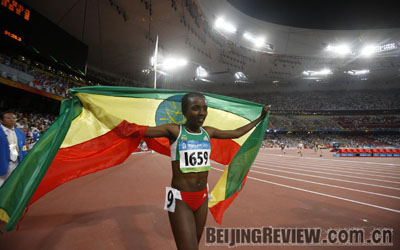|

FLY THE FLAG: Ethiopian athlete Tirunesh Dibaba celebrates after winning
gold in the women's 10,000-meter race and setting a world record
Coventry attended four swimming competitions. After finishing second on three occasions, she finally made history by defending her Olympic title and winning a gold in the 200-meter women's backstroke on August 16, with a world record time of 2 minutes 5.24 seconds, the 22nd swimming world record at these Olympics by that time.
"I just can't wait to go back to Zimbabwe to celebrate with my compatriots," recalled Coventry excitedly in an exclusive interview with Beijing Review. "I was so happy when I heard the national anthem of Zimbabwe in Beijing.
"I have trained hard for four years for the highest competition in the swimming world so as to be on top form," said Coventry, adding that her success will surely encourage more Zimbabweans to take up swimming.
Born in Harare, capital of Zimbabwe, in 1983, Coventry showed great interest in swimming as a child. "We do not have indoor pools, so swimming in winter is very hard," said Coventry.
In 2000, the 17-year-old high school student entered the Olympic delegation of Zimbabwe and participated in four competitions in Sydney. It was her debut in Sydney that caught the attention of Auburn University, Alabama, in the United States, which is famous for swimming education. The university granted her a scholarship for four years.
"It was really a good opportunity for me, though it was very hard for me to leave home," she said. She won a gold, a silver and a bronze at the Athens Olympics in 2004. This was the first gold medal for Zimbabwe since the country's hockey team won an Olympic gold medal in 1980 in Moscow. In Beijing, her efforts took Zimbabwe to the seventh place on the swimming medal list, behind the United States, Australia, China, Britain, France and Japan.
Coventry is currently studying in the United States. "I go back to Zimbabwe at least once a year and my parents, grandparent, uncles and aunts and cousins are living there," stressed Coventry.
Judo potential
African athletes also showed potential in other traditionally weak sports across the continent. On August 10, Algerian judoka Soraya Haddad won the first Olympic medal for Africa, taking bronze in the women's 52kg category. Three days later, her compatriot Amar Benikhlef won a silver in the men's 90 kg judo competition, and the bronze medal in this category went to Egyptian judoka Heshan Mesbah. African countries won more judo medals in Beijing than they have in all previous Olympics combined.
Benikhlef's breakthrough was cultivated by the International Judo Federation (IJF), established in Morocco, where judokas were coached by former Italian judo star Ezio Gamba, who was Olympic champion in Moscow in 1981 and won silver in Los Angeles in 1984.
"The International Training Center in Morocco was a test project which proved in a short period of time to be very successful. IJF will soon open a training center on each continent to develop judo all over the world," said IJF President Marius Vizer.
African countries sent 41 Judokas to compete in Beijing, mainly from northern Africa, including Algeria, Tunis, Morocco and Egypt.
| 